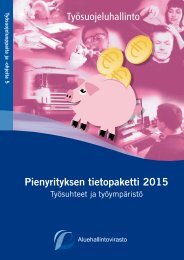urn_isbn_978-952-61-1770-6
urn_isbn_978-952-61-1770-6
urn_isbn_978-952-61-1770-6
- No tags were found...
Create successful ePaper yourself
Turn your PDF publications into a flip-book with our unique Google optimized e-Paper software.
ed and followed. The ECtHR’s role should be secondary: the Contracting Statesand their administrative infrastructure and personnel are the primary actors.The ECtHR only steps in when national legal remedies have been exhausted.Subsidiarity is concretised not only in the admissibility criteria (e.g. exhaustion ofdomestic remedies), but also in the fact that the Convention must be interpretedon the basis of the subsidiarity principle. In terms of formal legitimacy, the subsidiarityprinciple should be taken as one of the standard principles used in theinterpretation of Convention provisions. 206The fourth instance doctrine is one element of the principle of subsidiarity. Itensures that the role of the ECtHR is subsidiary to that of national authorities as regardsevaluation of the evidence or interpretation of applicable national legislation,and that it will not act as a court of appeal in relation to the decisions of nationalcourts applying national law. The rule is that the ECtHR will not disagree with anydecision made by a national court on the interpretation and application of its ownnational law. 207 The fourth instance doctrine supports the idea that the ECtHR’s legitimacyis achieved by safeguarding process: if the procedural requirements havebeen followed, the judgment is within the limits of what can be required and theECtHR cannot interfere. 208 By ensuring that the ECtHR keeps in mind the constitutionallimits of its competence, this doctrine acts as a brake on its interpretationsof the Convention. From the fourth instance point of view, legitimacy is assessedin formal terms, focusing on procedural steps as opposed to content. If allthe required procedural steps have been taken at national level, there is nothing tocriticise. Consequently, the ECtHR gains its legitimacy by maintaining the formalapproach of paying attention only to procedural requirements.The margin of appreciation doctrine is another element of the subsidiarityprinciple. This means that states are allowed a certain degree of discretion so thateach state’s special circumstances may be taken into account. It has been urgedthat in order to maintain its institutional credibility, the ECtHR must refrain frominterfering with the margin of appreciation granted to Contracting States. 209 Thedifference between the fourth instance doctrine and the margin of appreciationdoctrine is rather complex. In practice, it is often a matter of degree, since bothdoctrines give national authorities considerable discretion. 210 The visible differenceis that the argumentation used in relation to the margin of appreciationdoctrine is more extensive than that used in relation to the fourth instance doc-206See also Lübbe-Wolff 2012, at 14–15 where she introduces the concept of substantive subsidiarity.This basically means that the Convention system is subsidiary not only in a procedural sense but alsoin a substantive sense, in order to create only minimum human rights standards.207Harris et al. 2014, at 18.208For more on formal legitimacy, see Thomassen 2009, at 402–403; Barkhuysen – van Emmerik 2009.209Forowicz 2010, at 3–4. Furthermore, the margin of appreciation doctrine has been seen as a methodthat hinders the reception of international law in the Convention system (ibid., at 7–9); for more on this,see e.g. Arai-Takahashi 2001.210Harris et al. 2014, at 16.43




